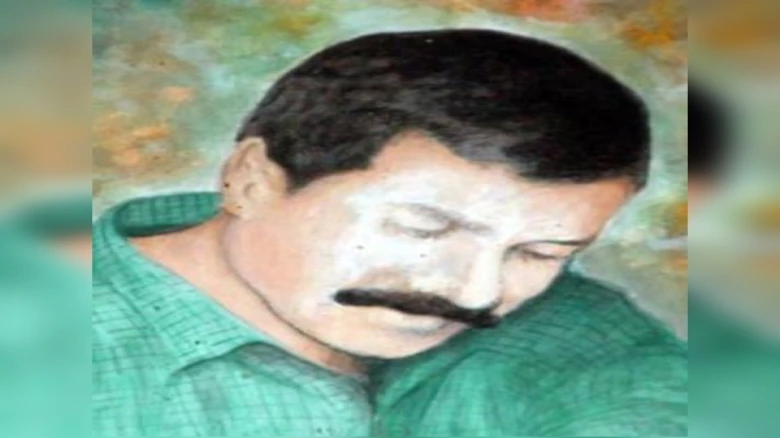Regional

He is a celebrated journalist, and many look up to his teachings, which still inspire a lot of regionalists in Assam
Digital Desk: On the 29th death anniversary of the revolutionary journalist and founder of human rights movements in Assam, Parag Kumar Das, let us get a glimpse of his great awakening journey.
Many call him a ‘radical’ Assamese journalist, many know him as a writer, and many have stored a soft corner for this fierce Assamese as a martyr who helped awaken society against the ‘barbaric and unequal behaviour’ of the then Government of India of the nineties beginning in 1947.
He is a celebrated journalist, and many look up to his teachings, which still inspire a lot of regionalists in Assam. He is known for his views on economics and social issues, and mostly for his harsh criticism of the central government.
Eminent painter Debabrata Mahanta, a teacher at the English department of Maran Women's College, paid tribute to the fearless journalist with a picture titled "I Want Justice" on Friday. “Even after 28 years of the ‘brutal murder’ of Parag Kumar Das, the journalist who has been deprived of justice is still imprisoned in the hope of justice," Debabrata Mahanta said.
Why is he remembered to date?
Parag Kumar Das, a significant figure in journalism and human rights activism, was born on February 24, 1961, in Shillong, India. He played a pivotal role as the former editor of Asomiya Pratidin and was a key founder of the human rights movement in Assam. Das, known for his radical views, was tragically assassinated at the age of 35 in 1996 by SULFA.
His legacy lives on through the Parag Kumar Das Memorial Trust, which continues to honour his contributions to human rights advocacy in Assam.
Throughout his career, Das made notable strides in journalism, launching Assamese magazines like Boodhbar and Agaan, and his work continues to inspire and advocate for human rights in the region. His assassination sparked international condemnation, shedding light on the challenges faced by human rights activists in Assam.
The assassination of Parag Kumar Das
On the afternoon of May 17, 1996, Parag Kumar Das, a prominent human rights activist in Assam, was assassinated in broad daylight while dropping off his young son from school in Guwahati. Das was shot dead by four members of the surrendered United Liberation Front of Asom (SULFA): Mridul Phukan, alias Samar Kakati; Diganta Baruah; Tapan Dutta, alias Biswajit Saikia; and Nayan Das, alias Guli. The brazen murder sparked outrage across Assam and among human rights groups nationwide.
Trial of Parag Kumar Das’s assassin
In 2001, the Central Bureau of Investigation (CBI) filed charges against the four accused SULFA members in the Kamrup District and Sessions Court. However, by this time, two of the accused, Diganta Baruah and Tapan Dutta, had already been killed in 1998 and 1999, respectively. In 2003, Nayan Das was hacked to death by an angry mob in Dibrugarh. Two other suspects, Promod Gogoi and Prabin Sarma, were not charged due to a lack of evidence. Mridul Phukan remained the sole surviving accused.
Judgement Controversy
After 13 years, on July 28, 2009, District and Sessions Judge Dilip Kumar Mahanta acquitted the prime accused, Mridul Phukan, citing a lack of solid evidence. The acquittal sparked criticism of the CBI's investigation and the court's judgement. Ajit Kumar Bhuyan, the then editor of Asomiya Pratidin, where Das worked as executive editor, said, "The judgement has exposed the hollowness of our inquiry and law system."
MASS Reactions
According to human rights activists, key witnesses were not interviewed, some were intimidated, and related materials were tampered with to ensure the acquittal of the accused and cover up the state machinery's role in the case. The human rights activists, media, friends, and family members of Das all felt betrayed by the CBI and the court. MASS leader Lachit Bordoloi expressed disappointment with the verdict and said the organisation would approach higher courts to continue the fight for justice for the slain activist.
Early Life
Parag Kumar Das, born on February 24, 1961, in Shillong, had a promising academic journey. He attended Chenikuthi Boys School, M.C.M.E. School, and Cotton Collegiate Government H.S. School for his lower primary, primary, and high schooling, respectively. In 1977, Das secured the 4th position in the HSLC examination and continued his success by achieving the 4th position in the pre-university examination from Cotton College in the science stream.
Determined to further his education, Das moved to Delhi, where he pursued his graduation in economics at St. Stephen's College. He then joined the Delhi School of Economics at the University of Delhi for a master's degree.
Das's professional life began in 1984, when he joined Punjab National Bank as a manager. His career progressed, and he was later appointed as a general manager at Unit Trust and the Guwahati Stock Exchange. In 1995, Das made a significant change by quitting his job and joining the Assamese daily Asomiya Pratidin as an editor.
Das's personal life includes his marriage to Purabi Das, with whom he has two children.
Leave A Comment